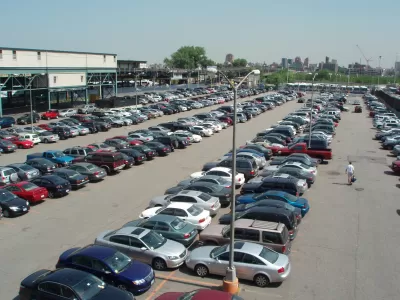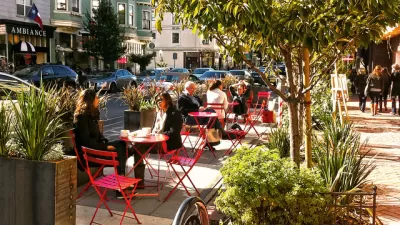Cities like Vancouver are rethinking parking minimums as they try to meet climate goals, reduce traffic, and reallocate street space to other modes.

To counter the current model of prioritizing parking with each new development, Vancouver's city council approved a motion shifting focus toward "open option parking," giving developers a choice when it comes to providing on-site parking. Acknowledging that car owners will look for on-street parking, the city is also implementing a permit parking system for resident vehicles. The goal, writes Frances Bula for the Sightline Institute, is to signal to the public that "roads are not free space or a right to free car storage," a mentality that has prevailed for decades in cities.
Like many cities, Vancouver has a parking requirement of roughly one stall for every residential unit and similar rules for different types of commercial and office space. Removing these requirements would make it the second Canadian city, and only one of a few in North America, to legalize optional on-site residential parking in the entire city.
Critics of "excessive" parking mandates argue that the regulations raise the cost of construction, reduce the space available for pedestrians, bikes, and other uses, and prioritize car owners above everyone else. As cities move to reduce greenhouse gas emissions, alleviate congestion, and provide more affordable housing, parking policies have come to signify an outdated planning tool that negatively impacts neighborhoods and the environment.
FULL STORY: The Hidden Costs of “Over-Parking” Our Cities

Study: Maui’s Plan to Convert Vacation Rentals to Long-Term Housing Could Cause Nearly $1 Billion Economic Loss
The plan would reduce visitor accommodation by 25,% resulting in 1,900 jobs lost.

Alabama: Trump Terminates Settlements for Black Communities Harmed By Raw Sewage
Trump deemed the landmark civil rights agreement “illegal DEI and environmental justice policy.”

North Texas Transit Leaders Tout Benefits of TOD for Growing Region
At a summit focused on transit-oriented development, policymakers discussed how North Texas’ expanded light rail system can serve as a tool for economic growth.

Paris Bike Boom Leads to Steep Drop in Air Pollution
The French city’s air quality has improved dramatically in the past 20 years, coinciding with a growth in cycling.

Why Housing Costs More to Build in California Than in Texas
Hard costs like labor and materials combined with ‘soft’ costs such as permitting make building in the San Francisco Bay Area almost three times as costly as in Texas cities.

San Diego County Sees a Rise in Urban Coyotes
San Diego County experiences a rise in urban coyotes, as sightings become prevalent throughout its urban neighbourhoods and surrounding areas.
Urban Design for Planners 1: Software Tools
This six-course series explores essential urban design concepts using open source software and equips planners with the tools they need to participate fully in the urban design process.
Planning for Universal Design
Learn the tools for implementing Universal Design in planning regulations.
Smith Gee Studio
Alamo Area Metropolitan Planning Organization
City of Santa Clarita
Institute for Housing and Urban Development Studies (IHS)
City of Grandview
Harvard GSD Executive Education
Toledo-Lucas County Plan Commissions
Salt Lake City
NYU Wagner Graduate School of Public Service





























